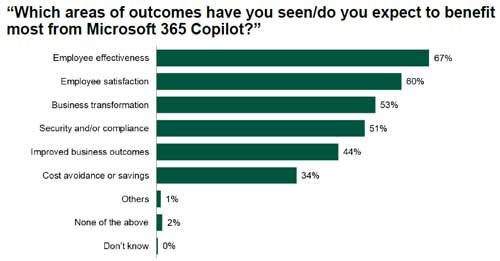News
Is Microsoft 365 Copilot Worth It? SMBs Count the Ways
- By Gladys Rama
- October 24, 2024
For organizations using the right Microsoft 365 SKUs, the Copilot add-on costs an additional $30 per user per month. According to a recent Forrester survey of over 250 SMBs worldwide, it's worth it.
"[E]arly SMB adopters of Microsoft 365 Copilot are optimizing their use of Microsoft 365 applications and transforming organizational workflows to achieve higher business efficiency and happier employees," the research group summarized in its report, which, incidentally, was commissioned by Microsoft.
Potential bias notwithstanding, Forrester's report is notable for attempting to quantify the long-term ROI of Microsoft 365 Copilot, which has been on the market for less than a year. It did this by creating a hypothetical SMB modeled on the aggregate characteristics of the survey's respondents. The result was a "composite" SMB with 200 employees and $35 million in annual revenue.
For this hypothetical SMB, at least, the ROI from Microsoft 365 Copilot included a 6 percent increase in revenue, a 0.85 percent reduction in expenditures, a 20 percent drop in employee attrition and 25 percent faster new-hire onboarding.
Real-life responses from survey participants support Forrester's projections. From the report:
- Over half of respondents either "experienced or expected" a reduction in supply chain costs by as much as 10 percent.
- Nearly six in 10 expected as much as a 20 percent reduction in operating costs.
- Nearly three-quarters reported an improvement in employee satisfaction.
- Over half said the ability to reduce "mundane tasks" using Microsoft 365 Copilot will cut employee attrition between 11 and 20 percent.
- Over 8 in 10 expected customer retention to improve by as much as 12 percent.
- Over three-quarters expected sales to increase by as much as 7 percent.
 [Click on image for larger view.]
(Source: Forrester)
[Click on image for larger view.]
(Source: Forrester)
Respondents also credited Microsoft 365 Copilot for reducing complexity around IT security and compliance management. "Interviewees noted that prior to using Microsoft 365 Copilot, teams relied on unsecured AI tools that were open to public access," Forrester said. "Copilot displaced these tools, improving data security."
According to the report:
- Over three-quarters of respondents expected Microsoft 365 Copilot to improve or streamline their IT security.
- Over two-thirds said using Microsoft 365 Copilot will reduce data and IP leaks.
- Nearly two-thirds expect an improvement in their ability to remain compliant with industry and government regulations.
The reception to Microsoft 365 Copilot that Forrester depicts in this report mirrors partner attitudes described in an earlier IDC study, though that one focused on Microsoft's AI offerings in general.